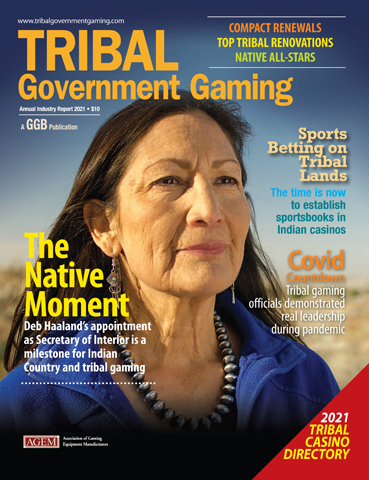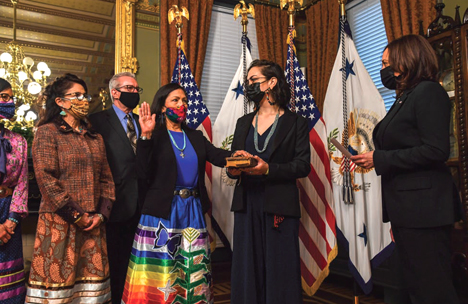
On March 15, New Mexico Rep. Debra Haaland made history with her confirmation as secretary of the U.S. Department of the Interior, the first Native American in U.S. history to join a White House Cabinet. On March 19, as she was sworn in by Vice President Kamala Harris, Haaland wore a traditional ribbon skirt, an homage to her indigenous heritage.
“Rep. Haaland’s confirmation represents a gigantic step forward in creating a government that represents the full richness and diversity of this country,” Senate Majority Leader Chuck Schumer said before the 51-40 vote. “Native Americans were, for far too long, neglected at the Cabinet level and in so many other places.”
The new secretary will oversee some 500 million acres of land: almost one-fifth the collective mass of the United States, spanning 1.7 billion acres of coastlines and including national parks, wildlife refuges and natural resources such as gas, oil and water. She will also manage the Bureau of Indian Affairs and Bureau of Indian Education, lead a workforce of 70,000 and oversee government-to-government relations with tribes.
Haaland is the third woman to serve as interior secretary, and stands eighth in line from the presidency. Yet her origins are modest. Born in 1960 in Winslow, Arizona to a 30-year combat Marine veteran and his wife, a Navy veteran, Haaland is an enrolled member of the Laguna Pueblo of New Mexico. As a young single mother, she used food stamps to feed her family, and struggled to put herself through college. After earning degrees from the University of New Mexico and UNM Law School, she started a small business producing and canning salsa.
Her career in politics began when she volunteered to boost voter turnout among Native Americans. In 2012, she joined the Obama campaign, and in 2014, ran unsuccessfully for lieutenant governor of New Mexico.
Haaland was the also first chairwoman of the Laguna Development Corp., where she was in charge of business operations for the second-largest tribal gaming enterprise in New Mexico. According to the Laguna Pueblo website, the organization now operates two casinos and a satellite facility: the Dancing Eagle Casino near Grants, New Mexico, the Route 66 Casino in Albuquerque, and the Casino Xpress, built as a temporary facility next to the Route 66 property, but kept in operation due to high demand.
She was the U.S. representative for New Mexico’s 1st Congressional District from 2019 to 2021; reelected in November, she vacated that seat to assume the new role at Interior.
She issued a statement following her appointment:
“At my confirmation hearing, I said that we all have a stake in the future of our country. No matter your political party or ZIP code, your ancestral heritage or income level, we all must take the formidable challenges that lie ahead seriously, and we will take them head-on, together.
“I am proud and humbled to lead the dedicated team at Interior as we seek to leave a livable planet for future generations. Together, we will work to advance President Biden’s vision to honor our nation-to-nation relationship with tribes, address the climate and nature crises, advance environmental justice and build a clean energy future that creates good-paying jobs and powers our nation.
“The change we need will take hard work and perseverance, but I know that together there is nothing we cannot accomplish.”
Native Reactions
News of Haaland’s appointment brought congratulations from across the Native American community.
“The confirmation of Deb Haaland as the United States’ first Native American secretary of the interior represents a remarkable moment for our nation,” said Ray Halbritter, CEO of Oneida Nation Enterprises, the business arm of the Oneida Indian Nation, which runs casinos in New York state. “Secretary Haaland has proven herself to be highly effective in uniting people of all backgrounds around shared purposes. And now, as interior secretary, her leadership will make an even more meaningful impact.”

Vice President Kamala Harris swore in Deb Haaland as interior secretary in a White House ceremony
Halbritter said Haaland’s ascent “marks a historical and significant triumph for Native people—and Native children in particular—to see a Native person represented at the highest level of U.S. government.”
“Breaking barriers is nothing new for Deb Haaland,” agreed Kenneth Manuel, CEO of Arizona’s Gila River Hotels & Casinos. “Indian Country watched with pride when she became one of the first two Native American congresswomen appointed in 2019, and we were overjoyed to see her make history yet again with her recent appointment as the first Native American to hold a presidential Cabinet position.
“We’re optimistic about the future, knowing that, as secretary of the interior, she has roots in the Southwest and has an extensive gaming background. We look forward to supporting her, and we are grateful to have her as a fierce advocate for Indian Country.”
In California, home of 109 federally recognized tribes and the site of hundreds of Indian casinos, legislative leaders applauded Haaland’s confirmation, calling it “a bridge to a new era.” Assemblyman James C. Ramos, chairman of the California Native American Legislative Caucus, said, “The appointment of a Native American as interior secretary is a milestone I wasn’t sure would happen in my lifetime. Indian Country wishes her every success as we cheer her achievement with pride and hope.”
James Siva, chairman of the California Nations Indian Gaming Association, believes Haaland could change the culture at Interior. “Since the Interior Department’s inception 172 years ago, it has often been a tormentor to tribes in its worst periods, and even a somewhat problematic institution in its better years,” he said. “To have someone in there that has been on the receiving end of Interior’s policies has tremendous value for tribes and the nation as a whole.”
Ernie Stevens Jr., chairman of the National Indian Gaming Commission (NIGC), cheered Biden’s nomination of Haaland when it was first announced in December, calling Haaland “a fierce advocate for Indian Country” and “a trailblazer during her career in public office.”
“It is time that one of our own from Indian Country is at the head of the Department of the Interior,” he said. “As the stewards of this land from time immemorial, we are more than confident that she will lead the department into a future that protects our land and treaty rights as Native peoples.”
‘She Is the Bridge’
Tribal Chairman Jeff Grubbe of the Agua Caliente Band of Cahuilla Indians, one of California’s most prominent and successful gaming tribes, told the Los Angeles Times, “It’s good to have one of us in a position that represents the administration and the federal government, but also represents us. She is the bridge.
“She understands how diverse tribes are,” Grubbe said. “Gaming is important to one, fishing is important to another, then you have oil. Renewable energy is something she wants to push, and we look forward to working with her and seeing what opportunities there are. Tribes are starting to think that not everything should just be gaming—we need to diversify.”
Tribal Chairwoman Sara Dutschke of the Ione Band of Miwok Indians added, “Outside of the gaming context, it would be really nice to see some emphasis on economic development as well.” And Willa Powless, councilwoman for the Klamath Tribes of Oregon, said Haaland’s leadership skills are well-recognized.
“As a matriarch herself, Secretary Haaland understands the complex issues and decisions tribes make. For the first time, it feels like tribes will be understood and listened to when advocating for our people.”
For Judith Shapiro, a Washington, D.C. attorney specializing in Indian law, there were “literally tears of joy because of the transfer of entirely white male power over the primary relationship between the federal government and Indian Country. And the fact that we don’t have to start from scratch in educating a new interior secretary about the realities of tribal governments—that’s huge.”
Jana McKeag, a former NIGC commissioner and Interior official, now president of Lowry Strategies, believes Haaland’s appointment will help bring attention to tribal issues.
“With the vast responsibilities of Interior,” she explains, “tribes are often overlooked. They’re usually at the bottom of the list when it comes to priorities. But with the staff she’s brought on, all with very extensive experience with tribal issues and Indian gaming, there’s no chance they’ll be overlooked.”
Siva says Haaland’s experience with tribal gaming can only be positive.
“I obviously cannot speak for every position that she has on every issue as it relates to tribal government gaming, but I don’t see how her own experience won’t inform her actions as secretary,” he says. “While it is impossible for Secretary Haaland to know offhand every tribe’s needs when it comes to gaming, at least with her there is no significant knowledge gap and learning curve pertaining to the general issues facing tribal government gaming.”
Valerie Spicer, the former executive director of the Arizona Indian Gaming Association and a co-founder of consulting firm the Trilogy Group, believes Haaland’s gaming experience should help her understand the issues of even the smallest gaming tribes.
“I believe that her knowledge of the benefits of tribal gaming from a firsthand perspective, especially for that of a rural Pueblo, will lend great insight into the needs to protect the rights of tribes to conduct gaming and their unique relationship with the state, be it good or bad,” says Spicer.
Shapiro says Haaland’s gaming experience means she will be aware of the difference between commercial and tribal gaming enterprises.
“She knows that the funds derived from Indian gaming are used for tribal government purposes,” she said. “She’ll understand how vital that revenue is by her experience in her community. Most of those tribes in New Mexico, where she’s from, experienced generations of poverty before gaming came along. She’s seen that change firsthand. That’s important.”
Regulatory Response
The NIGC is an independent agency housed within the Interior Department that regulates tribal gaming at the federal level. Commission Chairman E. Sequoyah Simermeyer said he applauds Haaland’s appointment.
 “The Department of the Interior and NIGC have a shared role in matters related to gaming on Indian land laid out in the Indian Gaming Regulatory Act, and the regulations our respective agencies have implemented. The NIGC knows firsthand how the distinct roles the department and the NIGC play with regard to the implementation of the Indian Gaming Regulatory Act can improve lives in Indian Country and be a catalyst for local economies.
“The Department of the Interior and NIGC have a shared role in matters related to gaming on Indian land laid out in the Indian Gaming Regulatory Act, and the regulations our respective agencies have implemented. The NIGC knows firsthand how the distinct roles the department and the NIGC play with regard to the implementation of the Indian Gaming Regulatory Act can improve lives in Indian Country and be a catalyst for local economies.
“The commission looks forward to working with Secretary Haaland on matters of shared interest and responsibility.”
Jonadev Chaudhuri, the most recent past chairman of the NIGC, calls Haaland’s appointment “historic.”
“The mission of the Department of the Interior is as broad as any department in government,” he says. “And to have somebody at the helm who not only understands the issues but also comes from Indian Country is entirely appropriate. Not to say that she’s going to be solely Indian Country-focused. During her confirmation testimony, she made the point that she was there to serve as secretary for the entire department and for the nation. I firmly believe she’s going to take an even-handed approach to advancing all of the various missions of the department.”
Chaudhuri warns, however, that there are lessons for Haaland to learn.
“No matter how much experience anybody has, there’s always a learning curve. It’s hard to be prepared for the full gamut of issues that a federal official faces as they navigate gaming issues among diverse nations, who all have their own unique histories, unique geographies, unique cultural traditions. I think her background both in Indian Country and with gaming will serve her well, but first she’s going to need support from the gaming community and Indian Country as she faces the massive learning curve that any official would undertake.”
Tom Foley, a former member of the NIGC and now with the Foley Quigley law firm, explains the sometimes rocky relationship between the agencies.
“I think the relationship will be cooperative in terms of how Interior and NIGC collaborate,” he says. “When I was with the NIGC along with (former chairman) Phil Hogen, we stressed it was an independent agency, and we took that responsibility seriously. But that has been deemphasized over the past 10 or 15 years because so many commissioners came from Interior and behaved like it was a department within Interior.
“I think the current commission will assert their independence a bit more and concentrate on their regulatory role. But they’ll be cooperative. Larry Roberts (Haaland’s chief of staff and former general counsel at NIGC) knows how it works, and I think they’ll be cooperative rather than confrontational.”
Chaudhuri believes each agency understands its role.
“NIGC is a regulatory body whose primary goal is to support tribal economic development and strong tribal governments through sound regulation, and as a result, their autonomy is important. They’re housed in Interior, but they’re an independent agency under the law. So in other words, finding the right balance, communication and respect for the boundaries is going to be critical.”
As Haaland said during her confirmation hearing before the Senate Energy Committee, “If an indigenous woman from humble beginnings can be confirmed as secretary of the interior, our country and its promise still holds true for everyone.”
Siva believes Haaland will be fair with the NIGC.
“Like other offices dealing directly with Indian Country within the Interior Department, such as the BIA, I would hope very much that she will seek to have the commission work to strengthen tribal sovereignty within the scope of its mission,” he says. “The commission and other tribal regulators serve a valuable role in ensuring that tribal government gaming runs as it should. Secretary Haaland no doubt knows that tribal government gaming is the most regulated form of gaming in the world, as it’s regulated at three levels of government.”
Shapiro believes the two agencies could work powerfully together.
“We now have a chairman and the two members of the NIGC who are all Native Americans,” she says. “I believe that’s the first time that happened. With the deep gaming expertise at Interior now, it’s a unique opportunity to work towards a truly cooperative relationship.”
Issue-Oriented
Hope for Haaland’s administration as it pertains to Native Americans runs high because of her experience and knowledge about Indian Country.

Haaland was chairwoman of the Laguna Development Corp., which owns the Route 66 Casino Hotel, before becoming a member of Congress
Siva would like to see a focus on “general government trust responsibilities with tribes, including a smooth process of taking acquired tribal lands into trust. Also, a proper distribution of federal stimulus disbursements to tribes, protecting tribal sacred sites.”
Spicer says communicating with tribes and addressing their issues is important, “ensuring that consultation is restored in a full and respectful way, where tribal governments are at the table and involved in anything that could impact or benefit their nation—not as an afterthought but throughout the process. When tribes have a true seat at the table, the discourse and outcome could be invaluable for all.”
Foley points to one issue that requires Interior and the NIGC to work together.
“Land-into-trust issues for gaming purposes go before both agencies,” he explains. “Interior has its position and the NIGC has its position, and they work together to reach a common ground. I think that’s still going to be very cooperative.”
Shapiro agrees that land-into-trust issues are important “because it’s not just a gaming issue. Yes, there are gaming ramifications for it, but there are also deep justice ramifications. The Obama administration saw restoring tribal homelands as one if its prime missions. That has to accelerate and expand.”
Tribal recognition is also important to Shapiro, but it’s a process that can take decades.
“The department revised its regulations in 2015, but we still have not seen a decision made under those new regulations,” she says. “They were supposed to be fair and equitable, but as always the fairness and equity can only be judged by how they’re applied. Hopefully, (Haaland) will have some influence over that.”
McKeag says Haaland “has a reputation of working across the aisle. She had more bipartisan legislation passed than any other member of Congress during her career. As a woman, I think she’s more focused on getting the job done. If that means you’ve got to talk to Mitch McConnell or any Republican leader to get a result, I think she’ll do that. Congressman Tom Cole, who is a staunch Republican, praised her for reaching across the aisle. So I think this is more important to her than the politics involved. She’s going to do what’s best for the tribes and the nation as a whole, because I think that’s part of how women see the world.”
Shapiro agrees that Haaland’s record of collaboration will be an asset.
“At the confirmation hearing, it was clear that as a woman she’d be able to listen to concerns that might not agree with her own views. She said she wanted to work with people and leave the bruised egos behind. I think you’re more likely to hear that from a woman.”
Spicer thinks the Native American element of a female secretary makes Haaland uniquely suited for the challenges.
“In many matrilineal societies, women bear a special place, because they are the mothers who grow the families and teach the young. Women have in large part worked to bring structure to the family, along with compassion and caring. The balance of it all can be difficult, but a woman such as Deb Haaland seems to do it almost effortlessly, although you know it hasn’t been easy. I hope she’s given the respect she deserves as she works her way through her position.
“I feel especially proud not only as a woman, but a Native woman from New Mexico, to know that she’s in her position at the Interior.”






